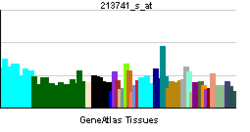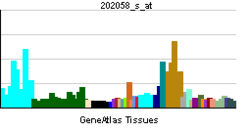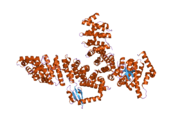Karyopherin alpha 1
Importin subunit alpha-1 is a protein that in humans is encoded by the KPNA1 gene.[1]
Interactions
Karyopherin alpha 1 has been shown to interact with KPNB1[2][3] and UBR5.[4]
References
- ↑ Cortes P, Ye ZS, Baltimore D (Sep 1994). "RAG-1 interacts with the repeated amino acid motif of the human homologue of the yeast protein SRP1". Proc Natl Acad Sci U S A 91 (16): 7633–7. doi:10.1073/pnas.91.16.7633. PMC 44456. PMID 8052633.
- ↑ Köhler, M; Speck C; Christiansen M; Bischoff F R; Prehn S; Haller H; Görlich D; Hartmann E (Nov 1999). "Evidence for distinct substrate specificities of importin alpha family members in nuclear protein import". Mol. Cell. Biol. (UNITED STATES) 19 (11): 7782–91. doi:10.1128/mcb.19.11.7782. ISSN 0270-7306. PMC 84838. PMID 10523667.
- ↑ Percipalle, P; Clarkson W D; Kent H M; Rhodes D; Stewart M (Mar 1997). "Molecular interactions between the importin alpha/beta heterodimer and proteins involved in vertebrate nuclear protein import". J. Mol. Biol. (ENGLAND) 266 (4): 722–32. doi:10.1006/jmbi.1996.0801. ISSN 0022-2836. PMID 9102465.
- ↑ Henderson, Michelle J; Russell Amanda J; Hird Samantha; Muñoz Marcia; Clancy Jennifer L; Lehrbach Gillian M; Calanni Sophina T; Jans David A; Sutherland Robert L; Watts Colin K W (Jul 2002). "EDD, the human hyperplastic discs protein, has a role in progesterone receptor coactivation and potential involvement in DNA damage response". J. Biol. Chem. (United States) 277 (29): 26468–78. doi:10.1074/jbc.M203527200. ISSN 0021-9258. PMID 12011095.
Further reading
- Bukrinsky MI, Haffar OK (2004). "HIV-1 nuclear import: in search of a leader.". Front. Biosci. 2: d578–87. doi:10.2741/A213. PMID 9366553.
- Bukrinsky MI, Haffar OK (1998). "HIV-1 nuclear import: matrix protein is back on center stage, this time together with Vpr.". Mol. Med. 4 (3): 138–43. PMC 2230352. PMID 9562972.
- Kino T, Pavlakis GN (2004). "Partner molecules of accessory protein Vpr of the human immunodeficiency virus type 1.". DNA Cell Biol. 23 (4): 193–205. doi:10.1089/104454904773819789. PMID 15142377.
- Bukrinsky MI, Sharova N, Dempsey MP, et al. (1992). "Active nuclear import of human immunodeficiency virus type 1 preintegration complexes.". Proc. Natl. Acad. Sci. U.S.A. 89 (14): 6580–4. doi:10.1073/pnas.89.14.6580. PMC 49545. PMID 1631159.
- Sharova N, Bukrinskaya A (1991). "p17 and p17-containing gag precursors of input human immunodeficiency virus are transported into the nuclei of infected cells.". AIDS Res. Hum. Retroviruses 7 (3): 303–6. doi:10.1089/aid.1991.7.303. PMID 2064827.
- Di Marzio P, Choe S, Ebright M, et al. (1996). "Mutational analysis of cell cycle arrest, nuclear localization and virion packaging of human immunodeficiency virus type 1 Vpr.". J. Virol. 69 (12): 7909–16. PMC 189735. PMID 7494303.
- Gallay P, Swingler S, Song J, et al. (1995). "HIV nuclear import is governed by the phosphotyrosine-mediated binding of matrix to the core domain of integrase.". Cell 83 (4): 569–76. doi:10.1016/0092-8674(95)90097-7. PMID 7585960.
- Moroianu J, Hijikata M, Blobel G, Radu A (1995). "Mammalian karyopherin alpha 1 beta and alpha 2 beta heterodimers: alpha 1 or alpha 2 subunit binds nuclear localization signal and beta subunit interacts with peptide repeat-containing nucleoporins.". Proc. Natl. Acad. Sci. U.S.A. 92 (14): 6532–6. doi:10.1073/pnas.92.14.6532. PMC 41552. PMID 7604027.
- Freed EO, Englund G, Martin MA (1995). "Role of the basic domain of human immunodeficiency virus type 1 matrix in macrophage infection.". J. Virol. 69 (6): 3949–54. PMC 189124. PMID 7745752.
- Weis K, Mattaj IW, Lamond AI (1995). "Identification of hSRP1 alpha as a functional receptor for nuclear localization sequences.". Science 268 (5213): 1049–53. doi:10.1126/science.7754385. PMID 7754385.
- O'Neill RE, Palese P (1995). "NPI-1, the human homolog of SRP-1, interacts with influenza virus nucleoprotein.". Virology 206 (1): 116–25. doi:10.1016/S0042-6822(95)80026-3. PMID 7831767.
- Gallay P, Swingler S, Aiken C, Trono D (1995). "HIV-1 infection of nondividing cells: C-terminal tyrosine phosphorylation of the viral matrix protein is a key regulator.". Cell 80 (3): 379–88. doi:10.1016/0092-8674(95)90488-3. PMID 7859280.
- Moroianu J, Blobel G, Radu A (1995). "Previously identified protein of uncertain function is karyopherin alpha and together with karyopherin beta docks import substrate at nuclear pore complexes.". Proc. Natl. Acad. Sci. U.S.A. 92 (6): 2008–11. doi:10.1073/pnas.92.6.2008. PMC 42412. PMID 7892216.
- von Schwedler U, Kornbluth RS, Trono D (1994). "The nuclear localization signal of the matrix protein of human immunodeficiency virus type 1 allows the establishment of infection in macrophages and quiescent T lymphocytes.". Proc. Natl. Acad. Sci. U.S.A. 91 (15): 6992–6. doi:10.1073/pnas.91.15.6992. PMC 44324. PMID 8041734.
- Heinzinger NK, Bukinsky MI, Haggerty SA, et al. (1994). "The Vpr protein of human immunodeficiency virus type 1 influences nuclear localization of viral nucleic acids in nondividing host cells.". Proc. Natl. Acad. Sci. U.S.A. 91 (15): 7311–5. doi:10.1073/pnas.91.15.7311. PMC 44389. PMID 8041786.
- Bukrinsky MI, Haggerty S, Dempsey MP, et al. (1993). "A nuclear localization signal within HIV-1 matrix protein that governs infection of non-dividing cells.". Nature 365 (6447): 666–9. doi:10.1038/365666a0. PMID 8105392.
- Dubrovsky L, Ulrich P, Nuovo GJ, et al. (1996). "Nuclear localization signal of HIV-1 as a novel target for therapeutic intervention.". Mol. Med. 1 (2): 217–30. PMC 2229944. PMID 8529100.
- Gallay P, Stitt V, Mundy C, et al. (1996). "Role of the karyopherin pathway in human immunodeficiency virus type 1 nuclear import.". J. Virol. 70 (2): 1027–32. PMC 189908. PMID 8551560.
- Bukrinskaya AG, Ghorpade A, Heinzinger NK, et al. (1996). "Phosphorylation-dependent human immunodeficiency virus type 1 infection and nuclear targeting of viral DNA.". Proc. Natl. Acad. Sci. U.S.A. 93 (1): 367–71. doi:10.1073/pnas.93.1.367. PMC 40239. PMID 8552640.
| |||||||||
This article is issued from Wikipedia - version of the Tuesday, January 05, 2016. The text is available under the Creative Commons Attribution/Share Alike but additional terms may apply for the media files.




